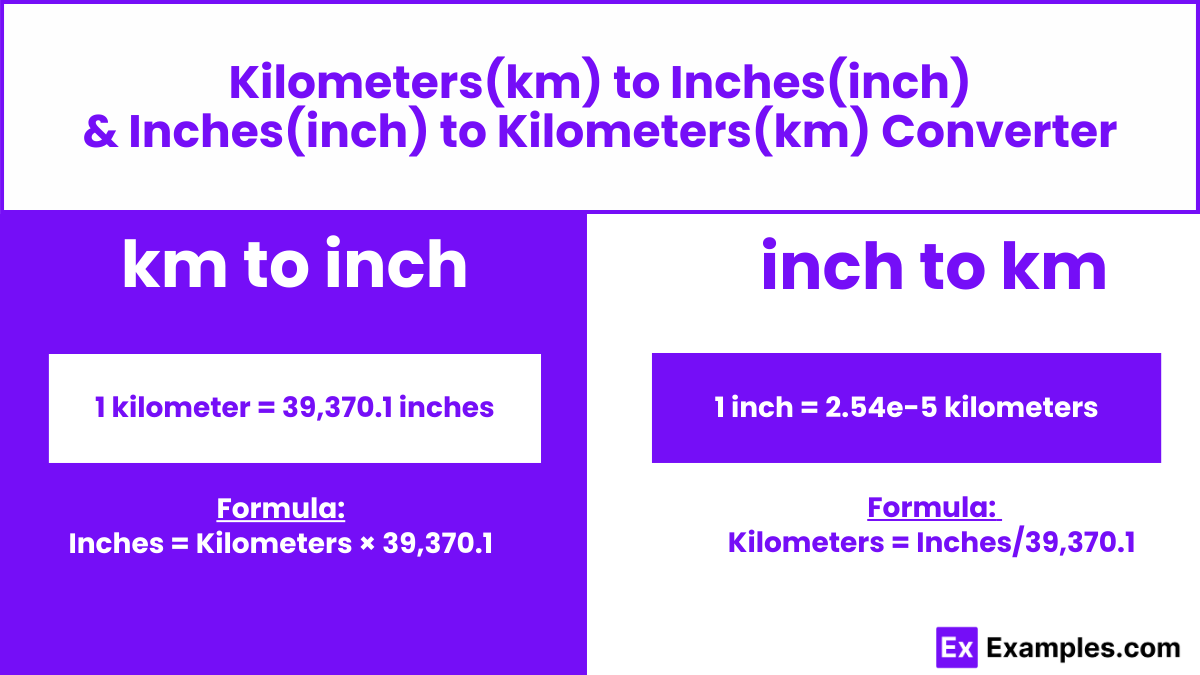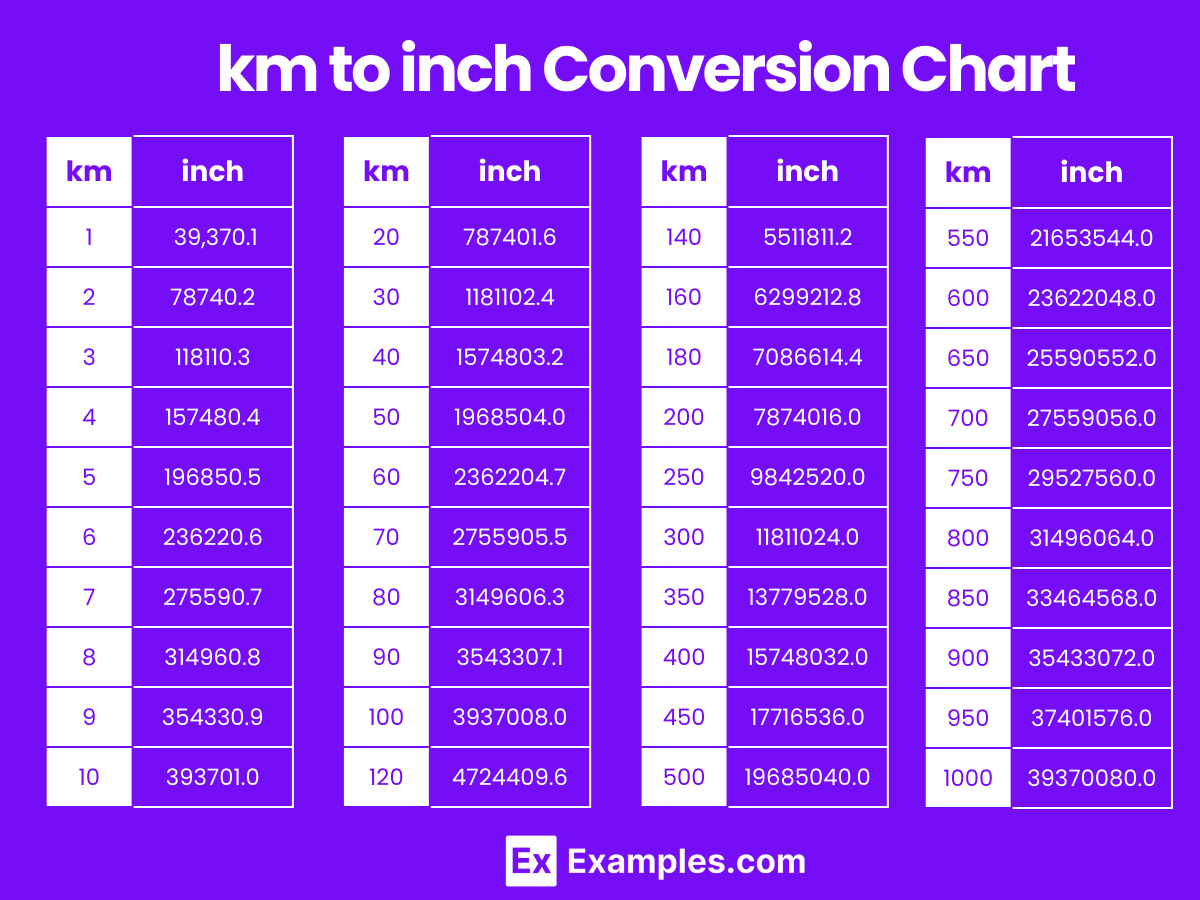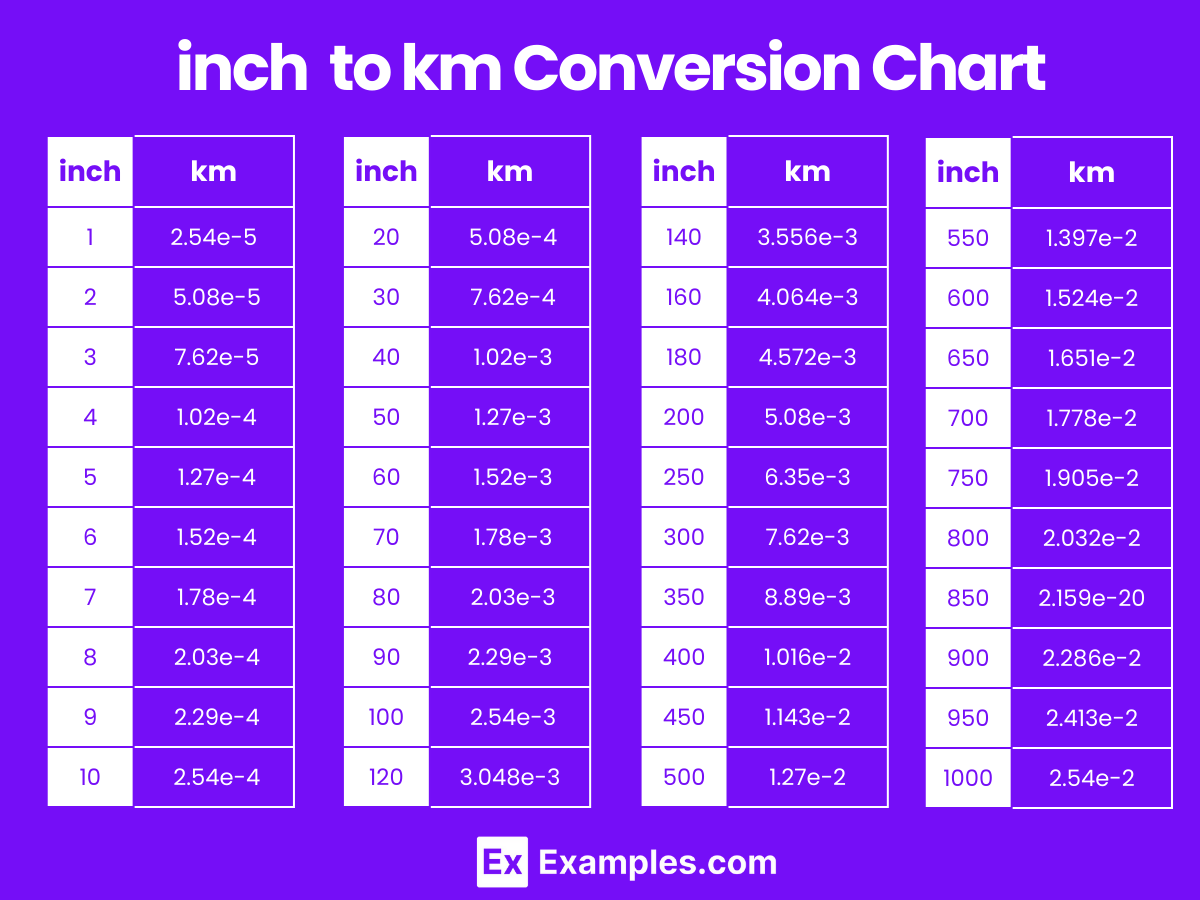Enter your measurements on Examples.com to easily convert lengths from kilometers to inches, and vice versa.
km to inch
Formula: Length in inches (inch ) = Length in kilometers (km) × 39,370.07874
Kilometer:
Inch:
| kilometers | Inches |
|---|---|
| 1 | 39370.07874 |
inch to km
Formula: Length in kilometers (km) = Length in inches (inch ) × 0.0000254
Inch:
Kilometer:
| Inches | Kilometers |
|---|---|
| 1 | 0.0000254 |
Length Converters to Kilometer (km)
| Meter to Kilometer | Centimeter to Kilometer | Millimeter to Kilometer |
| Micrometer to Kilometer | Mile to Kilometer | Yard to Kilometer |
| Feet to Kilometer | Inch to Kilometer | Nanometer to Kilometer |
Length Converters to Inch (in)
| Kilometer to Inch | Meter to Inch | Centimeter to Inch |
| Millimeter to Inch | Micrometer to Inch | Nanometer to Inch |
| Mile to Inch | Yard to Inch | Feet to Inch |
| Nautical Mile to Inch |
Conversion Factors:
- Kilometers to Inches: 1 kilometer = 39,370.1 inches
- Inches to Kilometers: 1 inch = 2.54e-5 kilometers
How to Convert Kilometers to Inches:
To convert kilometers to inches, multiply the number of kilometers by 39,370.1.
Inches=Kilometers×39,370.1
Example: Convert 2 kilometers to inches.
Inches=2×39,370.1=78,740.2 inches
How to Convert Inches to Kilometers:
To convert inches to kilometers, divide the number of inches by 39,370.1.
Kilometers=Inches/39,370.1
Example: Convert 50,000 inches to kilometers.
Kilometers=50,000/39,370.1=1.270 kilometers

Kilometers to Inches Conversion Table
| Kilometers (km) | Inches (in) |
|---|---|
| 1 km | 39,370.1 in |
| 2 km | 78,740.2 in |
| 3 km | 118,110.3 in |
| 4 km | 157,480.4 in |
| 5 km | 196,850.5 in |
| 6 km | 236,220.6 in |
| 7 km | 275,590.7 in |
| 8 km | 314,960.8 in |
| 9 km | 354,330.9 in |
| 10 km | 393,701.0 in |
| 20 km | 787,402.0 in |
| 30 km | 1,181,103.0 in |
| 40 km | 1,574,804.0 in |
| 50 km | 1,968,505.0 in |
| 60 km | 2,362,206.0 in |
| 70 km | 2,755,907.0 in |
| 80 km | 3,149,608.0 in |
| 90 km | 3,543,309.0 in |
| 100 km | 3,937,010.0 in |
km to inch Conversion Chart

Inches to Kilometers Conversion Table
| Inches (in) | Kilometers (km) |
|---|---|
| 1 in | 2.54e-5 km |
| 2 in | 5.08e-5 km |
| 3 in | 7.62e-5 km |
| 4 in | 1.02e-4 km |
| 5 in | 1.27e-4 km |
| 6 in | 1.52e-4 km |
| 7 in | 1.78e-4 km |
| 8 in | 2.03e-4 km |
| 9 in | 2.29e-4 km |
| 10 in | 2.54e-4 km |
| 20 in | 5.08e-4 km |
| 30 in | 7.62e-4 km |
| 40 in | 1.02e-3 km |
| 50 in | 1.27e-3 km |
| 60 in | 1.52e-3 km |
| 70 in | 1.78e-3 km |
| 80 in | 2.03e-3 km |
| 90 in | 2.29e-3 km |
| 100 in | 2.54e-3 km |
inch to km Conversion Chart

Difference Between Kilometers to Inches
| Feature | Kilometers (km) | Inches (in) |
|---|---|---|
| Unit Type | Metric system unit | Imperial system unit |
| Usage | Used for measuring longer distances such as travel distances between cities. | Commonly used to measure smaller lengths like the height of a person or the width of a book. |
| Conversion Factor | 1 kilometer is equivalent to 39,370.1 inches. | 1 inch is equivalent to 0.0000254 kilometers. |
| Symbol | km | in |
| Precision | More suitable for measuring large distances with high precision. | More suitable for detailed measurements in small-scale applications. |
| Global Adoption | Widely used worldwide, especially in countries that follow the metric system. | Predominantly used in the United States, the United Kingdom, and a few other countries. |
| Common Applications | Used in road measurements, geographic mapping, and sports events like marathons. | Used in construction, manufacturing, and by individuals for personal measurements. |
| Decimal System | Part of the decimal-based metric system, which makes calculations straightforward. | Part of the imperial system, which involves conversions among various units like feet and yards. |
1. Solved Examples on Converting Kilometers to Inches
Example 1: Convert 0.5 kilometers to inches.
0.5 km×39,370.1 in/km=19,685.05 in
0.5 kilometers is 19,685.05 inches.
Example 2: Convert 1.2 kilometers to inches.
1.2 km×39,370.1 in/km=47,244.12 in
1.2 kilometers is 47,244.12 inches.
Example 3: Convert 2.5 kilometers to inches.
2.5 km×39,370.1 in/km=98,425.25 in
2.5 kilometers is 98,425.25 inches.
Example 4: Convert 3 kilometers to inches.
3 km×39,370.1 in/km=118,110.3 in
3 kilometers is 118,110.3 inches.
Example 5: Convert 0.75 kilometers to inches.
0.75 km×39,370.1 in/km=29,527.575 in
0.75 kilometers is 29,527.575 inches
2. Solved Examples on Converting Inches to Kilometers
Example 1: Convert 10,000 inches to kilometers.
10,000 in39,370.1 in/km=0.254 km
10,000 inches is approximately 0.254 kilometers.
Example 2: Convert 50,000 inches to kilometers.
50,000 in39,370.1 in/km=1.270 km
50,000 inches is approximately 1.270 kilometers.
Example 3: Convert 82,000 inches to kilometers.
82,000 in39,370.1 in/km=2.083 km
82,000 inches is approximately 2.083 kilometers.
Example 4: Convert 100,000 inches to kilometers.
100,000 in39,370.1 in/km=2.540 km
100,000 inches is approximately 2.540 kilometers.
Example 5: Convert 120 inches to kilometers.
120 in39,370.1 in/km=0.00305 km
120 inches is approximately 0.00305 kilometers.
1. Is a kilometer bigger than an inch?
Yes, a kilometer is significantly larger than an inch. One kilometer equals 39,370.1 inches, making it a much greater measurement used for longer distances.
2. Why is it useful to convert kilometers to inches?
Converting kilometers to inches can be useful in contexts requiring precise measurements in engineering, scientific research, or when dealing with specifications in industries that use different measurement systems.
3. Can weather forecasts involve kilometers to inches conversion?
Yes, particularly in snowfall or rainfall measurements where data may need to be converted from millimeters (a metric unit) to inches for reports in certain regions like the United States.
4. How do I convert road signs in kilometers to inches?
To convert road sign distances from kilometers to inches, multiply the number of kilometers by 39,370.1. This will give you the equivalent distance in inches, which can be useful for understanding scale in certain contexts.
5. What mistakes should I avoid when converting kilometers to inches?
Common mistakes include using the wrong conversion factor, not accounting for decimal places, or miscalculating due to rounding errors. Always use a reliable calculator and double-check your work.

